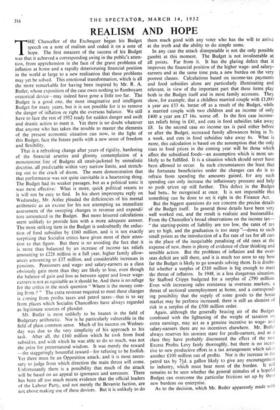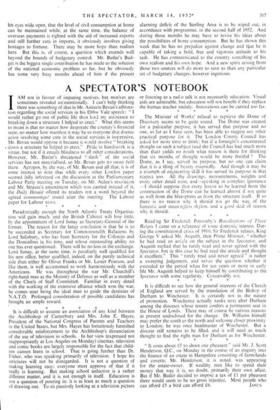REALISM AND HOPE T HE Chancellor of the Exchequer began his
Budget speech on a note of realism and ended it on a note of hope. The first measure of the success of his Budget was that it achieved a corresponding swing in the public's atten- tion, from apprehension in the face of the grave problems of inflation at home and a rapidly deteriorating financial position in the world at large to a new realisation that these problems may yet be solved. This emotional transformation, which is all the more remarkable for having been inspired by Mr. R. A. Butler, whose exposition of the case owes nothing to flamboyant oratorical device—may indeed have gone a little too far. The Budget is a good one, the most imaginative and intelligent Budget for many years, but it is not possible for it to remove the danger of inflation or right the overseas balance. We still have to face the rest of 1952 ready for sudden danger and swift and drastic action to meet it. Yet there is no doubt whatever that anyone who has taken the trouble to master the elements of the present economic situation can now, in the light of this Budget, face the future perils with a new sense of freedom and flexibility.
That is a refreshing change after years of rigidity, hardening of the financial arteries and gloomy contemplation of a monotonous line of Budgets all strait-jacketed by unrealistic doctrine, all predictable within very narrow limits, and stretch- ing out to the crack of doom. The mere demonstration that that performance was not quite inevitable is a heartening thing. The Budget had its weaker passages, but as a political tonic it was most effective. What is more, quick political retorts to it will not be easy to find. In his short impromptu reply on Wednesday, Mr. Attlee pleaded the deficiencies of his mental arithmetic as an excuse for his not attempting an immediate assessment of the sweeping changes in revenue and expendi: ture announced in the Budget. But more leisured calculations seem unlikely to provide him with a more adequate answer. The most striking item in the Budget is undoubtedly the reduc- tion of food subsidies by £160 million, and it is not exactly surprising that Socialist critics have given most of their atten- tion to that figure. But there is no avoiding the fact that it is more than balanced by an increase of income tax reliefs amounting to £228 million in a full year, higher family allow- ances amounting to £37 million, and considerable increases in pensions. Pensioners and wage- and salary-earners as a class obviously gain more than they are likely to lose, even though the balance of gain and loss as between upper and lower wage- earners is not as equitable as it should be. And there is no refuge for the critics in the stock question " Where is the money com- Me from ? " The extra revenue required to meet these changes is coming from profits taxes and petrol taxes—that is to say from places which Socialist Chancellors have always regarded as legitimate sources of plunder.
Mr. Butler is most unlikely to be beaten in the field of Budgetary arithmetic. Nor is he particularly vulnerable in the field of plain common sense. Much of his success on Wednes- day was due to the very simplicity of his approach to his task. After all, the £160 million which he took from food subsidies, and with which he was able to do so much, was not the prize for preternatural wisdom. It was merely the reward —the staggeringly bountiful reward—for refusing to be foolish. Yet there must be an Opposition attack, and it is most neces- sary to judge from which direction the main thrust will come. Unfortunately there is a possibility that much of the attack will be based on an appeal to ignorance and unreason. There has been all too much recent evidence that the official leaders of the Labour Party, and not merely the Bevanite faction, are not above making use of these devices. But it is unlikely to do them much good with any voter who has the will to arrive at the truth and the ability to do simple sums.
In any case the attack disreputable is not the only possible gambit at this moment. The Budget is not invulnerable at all points. Far from it. It has the glaring defect that it improves the financial position of the higher wage- and salary- earners -and at the same time puts a new burden on the very poorest classes. Calculations based on income-tax payments and food subsidies alone are particularly illuminating and relevant, in view of the important part that these items play both in the Budget itself and in most family accounts. They show, for example, that a childless married couple with £1,000 a year are £33 4s. better off as a result of the Budget, while a married couple with two children and an income of only £400 a year are 016s. worse off. In the first case income- tax reliefs bring in £41, and cuts in food subsidies take away £8. In the second case no income tax is paid either before or after the Budget, increased family allowances bring in 3s. a week, and cuts in food subsidies take away 6s. What is more, this calculation is based on the assumption that the only rises in food prices in the coming year will be those which affect the subsidised foods—an assumption which is most un- likely to be fulfilled. It is a situation which should never have been allowed to occur. In such circumstances the least that the fortunate beneficiaries under the changes can do is to refrain from spending the amounts gained, for any such spending can only increase the inflationary pressure and help to push prices up still further. This defect in the Budget had bent- be recognised at once. It is not impossible that something can be done to set it right in the Finance Act.
But the biggest questions do not concern the precise details- of the Budget itself. In general those details have been very well worked out, and the result is realistic and businesslike. From the Chancellor's broad observations on the income tax- " the starting-points of liability are too low, the rates of tax are to high, and the graduation is too steep "—down to such small points as the introduction of a flat rate of tax for all cars in the place of the inequitable penalising of old ones at the expense of new, there is plenty of evidence of clear thinking and sensible action. But the problems of inflation and the over- seas deficit are still there, and it is much too soon to say how far the Budget is likely to go towards solving them. It-is doubt- ful whether a surplus of £510 million is big enough to meet the threat of inflation. In 1948, in a less dangerous situation, Sir Stafford Cripps budgeted for a surplus of 2790 million. Even with increasing sales resistance in overseas markets, a threat of sectional unemployment at home, and a correspond- ing poSsibility that the supply of some goods to the home market may be perforce increased, there is still an element of risk in .a surplus of the £500 million order.
Again, although the generally bracing air of the Budget. combined with the lightening of the weight of taxation on extra earnings, may act as a genuine incentive to wage- and salary-earners there are no incentives elsewhere. Mr. Butler always reserves his stoniest stare for profit-earners, and as a class they have probably discounted the effect of the new Excess Profits Levy fairly thoroughly, but there is no incen- tive to new productive effort in a tax arrangement which takes another £100 million out of profits. Nor is the increase in the petrol tax by 74d. a gallon likely to give any encouragement to industry, which must bear most of the burden. It oil remains to be seen whether the general stimulus of a hopeful Budget can overcome the particular frictions set up by these new burdens on enterprise. As to the decision, which Mr. Butler apparently made with
his eyes wide open, that the level of civil consumption at home can be maintained while, at the same time, the balance of overseas payments is righted with the aid of increased exports and still further cuts in imports, it obviously involves giving hostages to fortune. There may be more hope than realism here. But this is, of course, a question which extends well beyond the bounds of budgetary control. Mr. Butler's Bud- get is the biggest single contribution he has made to the solution of the national economic problem so far, but he obviously has some very busy months ahead of him if the present alarming deficit of the Sterling Area is to be wiped out, in accordance with programme, in the second half of 1952. And during those months he may have to revise his ideas about the possibilities of home consumption. But he has shown this week that he has no prejudice against change and that he is capable of taking a bold, free and vigorous attitude to his task. He has communicated to the country something of his own realism and his own hope. And a new spirit arising from those two sources will do more to save us than any particular set of budgetary changes, however ingenious.











































 Previous page
Previous page